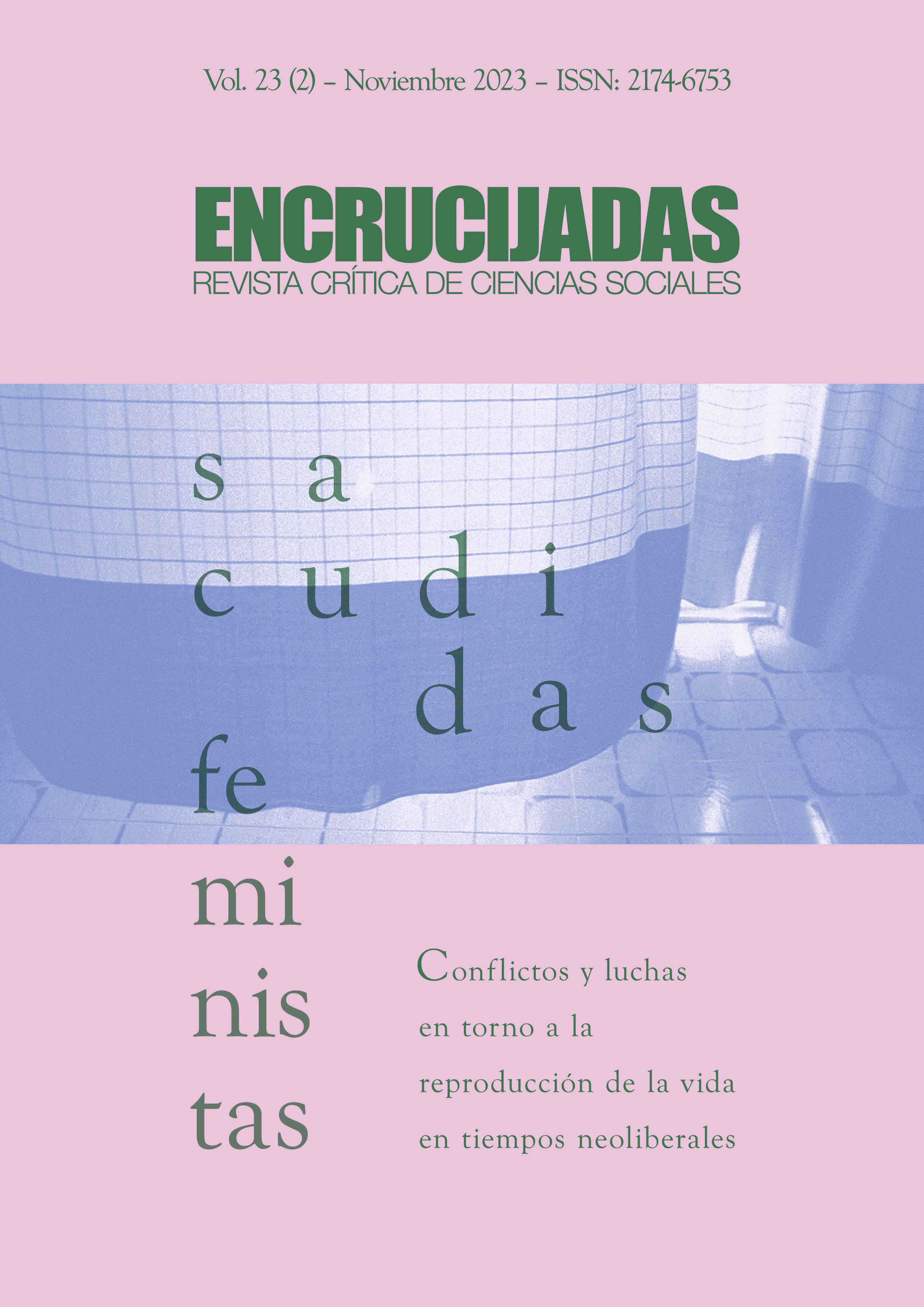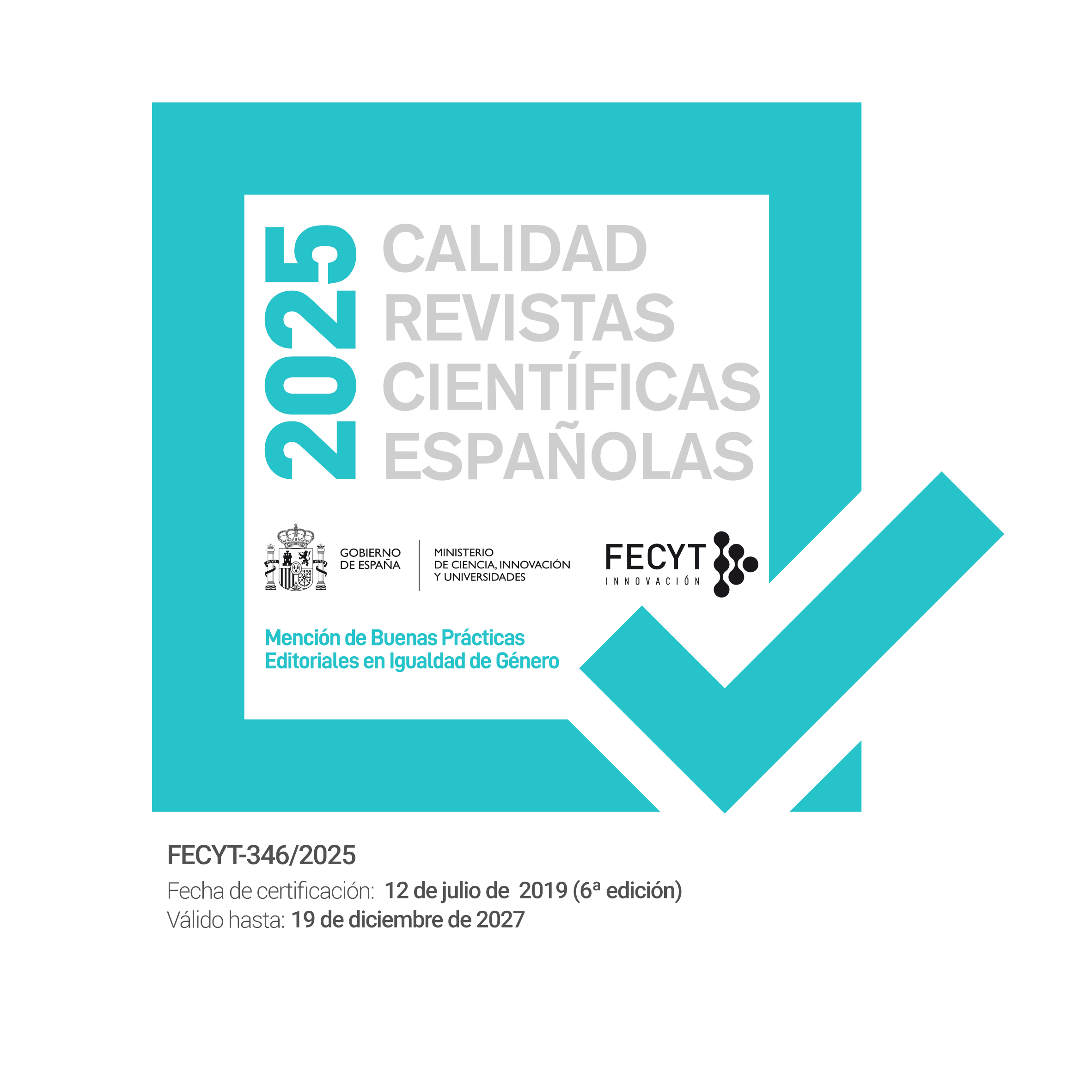Hacia una agenda política por el derecho a la ciudad de las mujeres
Palabras clave:
derecho a la ciudad, reproducción social, derechos sociales, movimiento de mujeresResumen
El artículo explora las potencialidades que radican en los debates que se suscitan en los Encuentros Nacionales de Mujeres (Argentina) para formar una plataforma de las mujeres por su derecho a la ciudad. El recorrido inicia con una revisión bibliográfica muy breve donde se expone una revisita del derecho a la ciudad desde la Teoría de la Reproducción Social y se da cuenta de la relevancia histórica de los Encuentros para los feminismos en el país que los cobija. Mediante un análisis documental de las Conclusiones publicadas de los Encuentros de 2008 a 2018, se lograron identificar elementos significativos para repensar el espacio social, las tensiones entre producción y reproducción y las implicancias de continuar sosteniendo un derecho a la ciudad que elimina el cuerpo y el hogar como territorios sensibles para la explicación de las experiencias cotidianas y su politización.
Descargas
Citas
Aladro, Almendra (2020). Las calles son nuestras (y las ciudades también): Las fases dialógica y escénica del Encuentro Nacional de Mujeres en la lucha por el derecho a la ciudad. Revista Vivienda y Ciudad, 7, 155-172.
Aladro, Almendra (2021). As mulheres em Lefebvre: para uma releitura do espaço urbano a partir dos feminismos marxistas. PLURAL, 28, 47-65. https://doi.org/10.11606/issn.2176-8099.pcso.2021.186026
Aladro, Almendra (2022). Por el derecho a la IVE periurbana: discusiones a partir de una investigación etnográfica en un barrio popular de Mar del Plata, Argentina. Revista Derecho y Ciencias Sociales, 26, e102. https://doi.org/10.24215/18522971e102
Alcaraz, María Florencia (2018). ¡Que sea ley! La lucha de los feminismos por el aborto legal. Marea Editorial.
Alessandri Carlos, Ana F. (2007). O Espaço Urbano: Novos Escritos sobre a Cidade. FFLCH.
Alves dos Santos Junior, Orlando (2014). Urban common space, heterotopia and the right to the city: Reflections on the ideas of Henri Lefebvre and David Harvey. Urbe. Revista Brasileira de Gestão Urbana, 6(2), 146-157. https://doi.org/10.7213/urbe.06.002.SE02
Arruzza, Cinzia y Tithi Bhattacharya (2020). Teoría de la Reproducción social. Elementos fundamentales para un feminismo marxista. Archivos de historia del movimiento obrero y de la izquierda, VIII(16), 37-69. https://doi.org/10.46688/ahmoi.n16.251
Bhattacharya, Tithi (2017). Social Reproduction Theory Remapping Class, Recentering Oppression. Pluto Press. https://doi.org/10.2307/j.ctt1vz494j
Biagi, Francesco (2020). Henri Lefebvre's Crital Theory of Space. Palgrave Macmillan. https://doi.org/10.1007/978-3-030-52367-1
Blomley, Nicholas (2003). From 'What?' to 'So What?': Law and geography in retrospect. Law and Geography, 5, 17-33. https://doi.org/10.1093/acprof:oso/9780199260744.003.0002
Butler, Chris (2012). Spatial politics, Everyday Life and the Right to the City. Routledge.
Cano, Julieta (2016). De la ciudadanía política a la ciudadanía sexual. Debates en Argentina en relación con el cuerpo de las mujeres. Cuestiones de género: de la igualdad y la diferencia, 11, 151-170. https://doi.org/10.18002/cg.v0i11.3624
Castro-Coma, Mauro y Marc Martí-Costa (2016). Comunes urbanos: de la gestión colectiva al derecho a la ciudad. Eure, 42(125), 131-153. https://doi.org/10.4067/S0250-71612016000100006
Ciriza, Alejandra (2020). Tramar/urdir genealogías feministas situadas. Los desafíos del espacio y el tiempo. La Aljaba, 26, 145-157.
Concejo Álvarez, Pilar (1998). Prólogo a la edición española. En: C. Booth, J. Drake y S. Yeandle (comp.), La vida de las mujeres en las ciudades. La ciudad, un espacio para el cambio (pp.13-18). Narcea.
Cristeche, Mauro (2020). Capital Accumulation, the Role of the State and Human Rights in Argentina: Contributions for debates on economic and social right. Oñati Social-Legal Series, 10(4), 717-743. https://doi.org/10.35295/osls.iisl/0000-0000-0000-1119
Dikeç, Mustafa (2001). Justice and spatial imagination. Environment and Planning, 33, 1785-1805. https://doi.org/10.1068/a3467
Draper, Susana (2018). El paro como proceso: construyendo poéticas de un nuevo feminismo. En V. Gago, R. Gutiérrez Aguilar, S. Draper, M. Menéndez Díaz, M. Montanelli y S. Rolnik, 8M Constelación feminista: ¿Cuál es tu huelga? ¿Cuál es tu lucha? (pp.49-72). Tinta Limón.
Falú, Ana María (2014). El derecho de las mujeres a la ciudad. Espacios públicos sin discriminaciones y violencias. Revista Vivienda y Ciudad,1, 10-28.
Fenster, Tovi (2005). The Right to the Gendererd City: Different Formations of Belonging in Everyday Life. Journal of Gender Studies, 14(3), 217-231. https://doi.org/10.1080/09589230500264109
Ferguson, Susan (2016). Intersectionality and Social-Reproduction Feminisms. Toward an Integrative Ontology. Historial Materialism, 24(2), 38-60. https://doi.org/10.1163/1569206X-12341471
Ferguson, Susan (2020). Women and Work: Feminism, Labour and Social Reproduction. Pluto Press. https://doi.org/10.2307/j.ctvs09qm0
Follegatti Montenegro, Luna y Pierina Ferretti (2020). 'Hasta que valga la pena vivir': violencia y reproducciónn social como claves de la emergencia feminista contemporánea en América Latina. Anuario de Historia, 32, 293. https://doi.org/10.35305/aeh.vi32.293
Fraser, Nancy (2016). Capitalism's Crisis of Care. Dissent, 63(14), 30-37. https://doi.org/10.1353/dss.2016.0071
Gago, Verónica (2019). El cuerpo del trabajo. Tres escenas cartografiadas desde el paro feminista. A contracorriente. Una revista de estudios latinoamericanos, 16(3), 39-60.
Gago, Verónica (2020). Feminist International. How to change everything. Verso.
García, Lila E. (2021). Del derecho como disciplina social al diseño de investigaciones jurídicas. La Rivada. Investigaciones en Ciencias Sociales, 9(16),171-191.
Gutiérrez, María Alicia (2021). Rights and Social Struggle: The Experience of the National Campaing for the Right to Legal, Safe and Free Abortion in Argentina. En: B. Sutton y N.L. Vaccarezza (eds.), Abortion and Democracy: Contentious Body Politics in Argentina, Chile and Uruguay (pp.157-174). Routledge. https://doi.org/10.4324/9781003079903-8
Hill, Priscilla María (2019). "Planeros: la construcción social de una alteridad indeseable". 1º Congreso Internacional de Ciencias Humanas - Humanidades entre pasado y futuro, Escuela de Humanidades, Universidad Nacional de San Martín, General San Martín.
Huchzermeyer, Marie (2017). The legal meaning of Lefebvre's the right to the city: addressing the gap between global campaign and scholary debate. GeoJournal, 83, 631-644. https://doi.org/10.1007/s10708-017-9790-y
Iucci, Matías José (2018). Redes políticas y programas sociales: dos experiencias de economía social en un municipio bonaerense. Publicaciones Ciencias Sociales Universidad Nacional de Quilmes.
Kriger, Pablo (2021). El análisis de contenido en textos normativos: propuestas prácticas en Ciencias Sociales. Revista de Investigación Interdisciplinaria en Métodos Experimentales, 1, 9-33.
Lariagon, Renaud (2020). Los Comunes Urbanos Frente a la Teoría del Espacio Social de Henri Lefebvre. ACME: An International E-Journal for Critical Geographies, 19(3), 610-627.
Lefebvre, Henri [1968] (2017). El derecho a la ciudad. Capitán Swing.
Lefebvre, Henri [1974] (2013). La producción del espacio. Capitán Swing.
Lindón Villorías, Alicia (2003). La riqueza y la miseria de la vida cotidiana en la ciudad: el pensamiento de Lefebvre. Revista Litorales, 2(3), s/n.
Lindón Villorías, Alicia (2012). Las huellas de Lefebvre en la vida cotidiana. Revista Veredas, 25, 39-60.
Luparello, Velia S. (2017). Aborto y capitalismo: un análisis de las políticas de control poblacional y de desarrollo económico de América Latina desde la mirada de la Teoría de la Reproducción Social (1950-1980). Diálogos. Revista Electrónica de Historia, 18(2), 103-121. https://doi.org/10.15517/dre.v18i2.26376
Lyytinen, E. (2020). 'In a group you feel OK, but outside there you are ready to die'. The role of a support group in disabled refugees' struggles for their 'right to the city' in Kampala, Uganda. En M.E. Leary-Owhin y J.P. McCarthy (eds), The Routledge Handbook of Henri Lefebvre, The City and Urban Society (pp.382-391). Routledge. https://doi.org/10.4324/9781315266589-40
Marcuse. Peter (2012). ¿Qué derecho para qué ciudad en Lefebvre? Urban, 2, 17-21.
Njoh, Ambe J. (2017). 'The Right-to-the-City Question' and Indigenous Urban Populations in Capital Cities in Cameroon. Journal of Asian and African Studies, 52(2), 188-200. https://doi.org/10.1177/0021909615570954
Penalva-Verdú, Clemente; Antonio Alaminos, Francisco Francés, Óscar Santacreu, (2015). La investigación cualitativa. Técnicas de investigación y análisis con ATLAS.ti. PYDLOS ediciones.
Rodó de Zárate, María (2015). El acceso de la juventud al espacio público en Manresa. Una aproximación desde las geografías feministas de la interseccionalidad. Scripta Nova, 18(504), pp.1-26.
Torres, Fernanda V. (2016). Henri Lefebvre y el espacio social: aportes para analizar procesos de institucionalización de movimientos sociales en América Latina - La Organización Barrial Tupac Amaru (Jujuy, Argentina). Sociologias, 43, 240-270. https://doi.org/10.1590/15174522-018004311
Vacchelli, Elena y Magali Peyrefitte (2017). From a/topia to topia: Towards a gendered right to the city for migrant volunteers in London. Cities, 76, 12-17. https://doi.org/10.1016/j.cities.2017.04.007
Vaiou, Dina (2014). Is the crisis in Athens (also) gendered?: Facets of access and (in)visibility in everyday spaces. City: analysis of urban trends, culture, theory, policy, action, 18(2), 533-537. https://doi.org/10.1080/13604813.2014.939474
Vaiou, Dina y Rouli Lykogianni (2006). Women, Neighbourhoods and Everyday Life. Urban Studies, 43(4), 731-743. https://doi.org/10.1080/00420980600597434
Varela, Paula (2009). Territorios de sujetos peligrosos. Lucha de Clases. Revista Marxista de Teoría y Política, 12, 111-130.
Varela, Paula (2020). Paro internacional de mujeres: ¿nueva tradición de lucha del movimiento feminista? Conflicto social, 13(24), 132-161.
Descargas
Publicado
Cómo citar
Número
Sección
Licencia
Derechos de autor 2023 Encrucijadas. Revista Crítica de Ciencias Sociales

Esta obra está bajo una licencia internacional Creative Commons Atribución-NoComercial-SinDerivadas 4.0.
Los autores/as conservan los derechos de autor y ceden a la revista el derecho de la primera publicación, con el trabajo registrado con la licencia de atribución de Creative Commons Reconocimiento-NoComercial (CC-BY 4.0), que permite a terceros utilizar lo publicado siempre que mencionen la autoría del trabajo y a la primera publicación en esta revista. Encrucijadas permite y se anima a todas las personas autoras a depositar la versión final publicada en repositorios institucionales o temáticos de acceso abierto, cumpliendo en caso necesario los términos establecidos por la entidad financiadora de la investigación.





